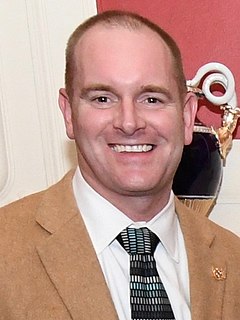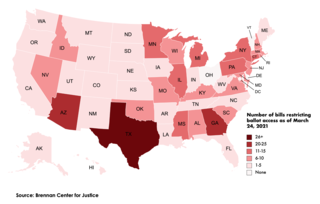Related Research Articles
Electoral fusion is an arrangement where two or more political parties on a ballot list the same candidate, pooling the votes for that candidate. It is distinct from the process of electoral alliances in that the political parties remain separately listed on the ballot. The practice of electoral fusion in jurisdictions where it exists allows minor parties to influence election results and policy by offering to endorse or nominate a major party's candidate.
Elections in the United States refers to the rules and procedures regulating the conditions under which a candidate, political party, or ballot measure is entitled to appear on voters' ballots. As the nation's election process is decentralized by Article I, Section 4, of the United States Constitution, ballot access laws are established and enforced by the states. As a result, ballot access processes may vary from one state to another. State access requirements for candidates generally pertain to personal qualities of a candidate, such as: minimum age, residency, citizenship, and being a qualified voter. Additionally, many states require prospective candidates to collect a specified number of qualified voters' signatures on petitions of support and mandate the payment of filing fees before granting access; ballot measures are similarly regulated. Each state also regulates how political parties qualify for automatic ballot access, and how those minor parties that do not can. Fundamental to democracy, topics related to ballot access are the subject of considerable debate in the United States.

Elections in the United States are held for government officials at the federal, state, and local levels. At the federal level, the nation's head of state, the president, is elected indirectly by the people of each state, through an Electoral College. Today, these electors almost always vote with the popular vote of their state. All members of the federal legislature, the Congress, are directly elected by the people of each state. There are many elected offices at state level, each state having at least an elective governor and legislature. There are also elected offices at the local level, in counties, cities, towns, townships, boroughs, and villages; as well as for special districts and school districts which may transcend county and municipal boundaries. According to a study by political scientist Jennifer Lawless, there were 519,682 elected officials in the United States as of 2012.

In the United States, Election Day is the annual day set by law for the general elections of federal public officials. It is statutorily set by the Federal Government as "the Tuesday next after the first Monday in the month of November" equaling the Tuesday occurring within November 2 to November 8.
Age of candidacy is the minimum age at which a person can legally hold certain elected government offices. In many cases, it also determines the age at which a person may be eligible to stand for an election or be granted ballot access.

Elections in California are held to fill various local, state and federal seats. In California, regular elections are held every even year ; however, some seats have terms of office that are longer than two years, so not every seat is on the ballot in every election. Special elections may be held to fill vacancies at other points in time. Recall elections can also be held. Additionally, statewide initiatives, legislative referrals and referendums may be on the ballot.
The Voting Accessibility for the Elderly and Handicapped Act (VAEHA) P.L. 98-435, 42 U.S.C. §§ 1973ee–1973ee-6, is a United States law passed in 1984 that mandates easy access for handicapped and elderly person to voter registration and polling places during Federal elections

Electoral reform in Colorado refers to efforts to change the voting laws in the Centennial State.

Lee v. Keith, 463 F.3d 763 was a case in which, on September 18, 2006, the United States Court of Appeals for the Seventh Circuit struck down Illinois' ballot access laws, opining:
In combination, the ballot access requirements for independent legislative candidates in Illinois--the early filing deadline, the 10% signature requirement, and the additional statutory restriction that disqualifies anyone who signs an independent candidate's nominating petition from voting in the primary--operate to unconstitutionally burden the freedom of political association guaranteed by the First and Fourteenth Amendments. Ballot access barriers this high--they are the most restrictive in the nation and have effectively eliminated independent legislative candidacies from the Illinois political scene for a quarter of a century--are not sustainable based on the state's asserted interest in deterring party splintering, factionalism, and frivolous candidacies.

The election of the president and the vice president of the United States is an indirect election in which citizens of the United States who are registered to vote in one of the fifty U.S. states or in Washington, D.C., cast ballots not directly for those offices, but instead for members of the Electoral College. These electors then cast direct votes, known as electoral votes, for president, and for vice president. The candidate who receives an absolute majority of electoral votes is then elected to that office. If no candidate receives an absolute majority of the votes for president, the House of Representatives elects the president; likewise if no one receives an absolute majority of the votes for vice president, then the Senate elects the vice president.

A voter identification law is a law that requires a person to show some form of identification in order to vote. In some jurisdictions requiring photo IDs, voters who do not have photo ID often must have their identity verified by someone else or sign a Challenged Voter Affidavit in order to receive a ballot to vote.

Statewide elections in the U.S. state of North Dakota take place every two years. Most executive offices and all legislators are elected to four-year terms, with half the terms expiring on U.S. Presidential election years, and the other half expiring on mid-term election years.

Jason Charles Gallion is a Republican member of the Maryland Senate from the 35th district in Cecil County and Harford County.

The Illinois general election was held on November 3, 2020. Primary elections, held using an open primary system, took place on March 17, 2020.

A general election will be held in the U.S. state of Illinois on November 8, 2022. The elections for United States Senate and United States House of Representatives, Governor, statewide constitutional officers, Illinois Senate, and Illinois House will be held on this date.

A general election was held in the U.S. state of Pennsylvania on November 3, 2020. The office of the Pennsylvania Secretary of the Commonwealth oversees the election process, including voting and vote counting.

On November 2, 2010, Illinois voters approved the Illinois Governor Recall Amendment, a legislatively referred constitutional amendment to the Constitution of Illinois. The amendment changed the state constitution to allow recall elections of Illinois governors.

Following the 2020 United States presidential election and the unsuccessful attempts by Donald Trump and various other Republican officials to overturn it, Republican lawmakers initiated a sweeping effort to make voting laws more restrictive within several states across the country. According to the Brennan Center for Justice, as of October 4, 2021, more than 425 bills that would restrict voting access have been introduced in 49 states—with 33 of these bills enacted across 19 states so far. The bills are largely centered around limiting mail-in voting, strengthening voter ID laws, shortening early voting, eliminating automatic and same-day voter registration, curbing the use of ballot drop boxes, and allowing for increased purging of voter rolls. Republicans in at least eight states have also introduced bills that would give lawmakers greater power over election administration after they were unsuccessful in their attempts to overturn election results in swing states won by Democratic candidate Joe Biden in the 2020 election.
The Election Integrity Act of 2021, originally known as the Georgia Senate Bill 202, is a law in the U.S. state of Georgia overhauling elections in the state. It mandates voter identification requirements on absentee ballots, limits the use of ballot drop boxes, expands in-person early voting, bars officials from sending out unsolicited absentee ballot request forms, reduces the amount of time people have to request an absentee ballot, increases voting stations or staff and equipment where there have been long lines, makes it a crime for outside groups to give free food or water to voters waiting in line in order to solicit votes, gives the Georgia General Assembly greater control over election administration, and shortens runoff elections, among other provisions.
Wesley Harrison Allen is an American politician and former probate judge serving as a member of the Alabama House of Representatives from the 89th district. He assumed office on November 7, 2018. Allen won the Republican nomination for secretary of state of Alabama on June 21, 2022.
References
- ↑ Cumulative Voting, Mary Wisniewski, June 2000.
- ↑ Judge orders election board to certify Illinois SEP candidate, Jerome White, Sept. 20, 2006.
- ↑ Pearson, Rick; Petrella, Dan (17 Jun 2021). "Pritzker signs election package that moves 2022 primary to June, makes fixtures of curbside and mail-in voting". chicagotribune.com. Chicago Tribune. Retrieved 20 August 2021.
- ↑ Williams, Jordan (18 June 2021). "Illinois governor signs law expanding curbside voting, permanent vote by mail". The Hill . Washington, DC. Retrieved 17 October 2021.